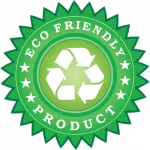Microcement Kitchen: A Mediterranean Spa Oasis in a Condo Renovation
Kitchen renovations in condos often come with unique challenges: tight spaces, strict building regulations, and the desire for a luxurious upgrade without a full-scale demolition. We recently had the pleasure of tackling just such a project in a bustling Yorkville, Toronto condo, where our clients dreamed of a serene, Mediterranean spa-like kitchen. The secret weapon? Microcement.
Their kitchen, while functional, suffered from common condo woes: tired granite countertops and dated ceramic backsplash tiles. They yearned for a sleek, organic aesthetic but were wary of the disruption and cost associated with tearing out existing surfaces. Enter microcement – the versatile, seamless, waterproof, and incredibly stylish solution.
Microcement Countertop and Microcement Backsplash Installation: A Seamless Kitchen Renovation – Yorkville, Toronto
Speak To Shayan 416 (606) 8060 or Request A Quote
The Microcement Kitchen Magic: A Luxury Look, Budget-Friendly Transformation
What makes microcement a game-changer for a microcement kitchen renovation? Its ability to transform classic problem areas such as tired kitchen countertops and grotty bathrooms with no demolition. This meant we could directly apply the microcement right over the existing granite countertops and backsplash tiles. This eliminated the mess, noise, and significant cost savings associated with demolition and extensive surface prep.
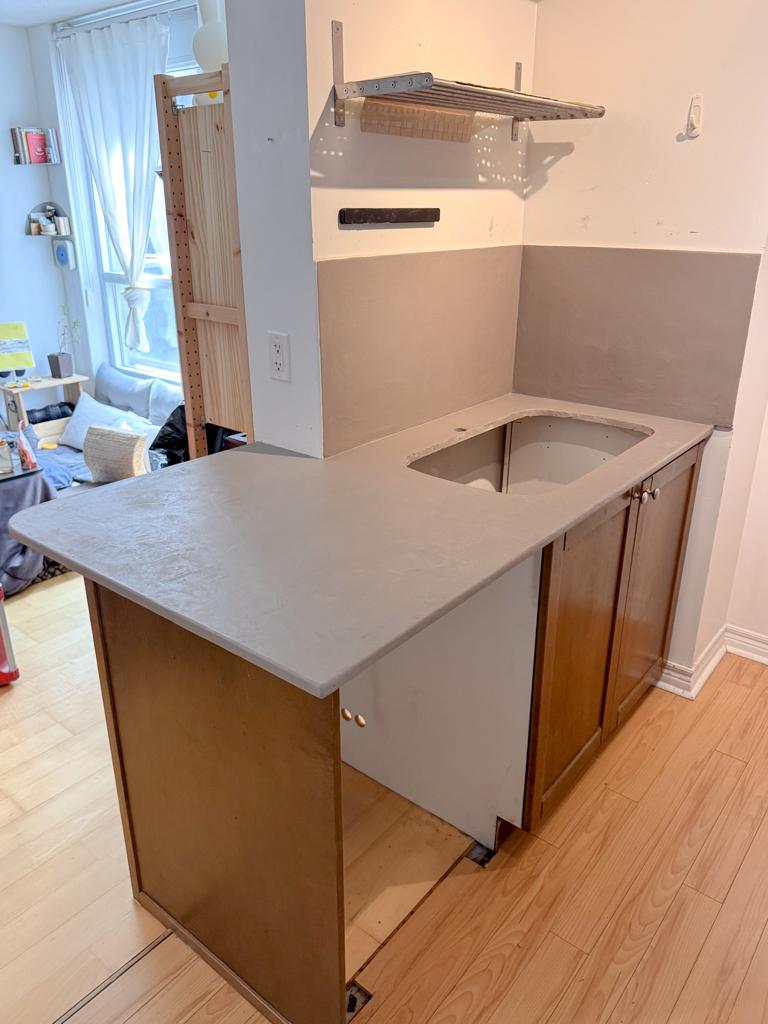
Finished Microcement Kitchen Condo Upgrade in Yorkville – Toronto
Why Microcement Is the Ultimate Kitchen Upgrade
Seamless Application: One of microcement’s most striking features is its lack of grout lines. This creates a continuous surface that instantly elevates a space, making smaller kitchens feel larger and more open.
Durable & Waterproof: This advanced microcement is waterproof in mass, meaning it’s inherently impermeable and doesn’t rely solely on a sealant to prevent moisture. The sealant is applied to protect the surface and achieve a desired finish—matte or gloss (we typically use the matte finish). This inherent waterproofing is essential for high-traffic, moisture-prone areas like kitchens.
Stain Resistant: You don’t have to worry about splashes or spills. This material is not damaged by stains and heat tolerant.
Lightweight: Unlike traditional concrete, microcement is remarkably lightweight, making it an ideal choice for multi-story condo buildings where structural load can be a concern.
Customizable: Microcement is incredibly versatile. It can be applied on any surface and comes in a wide range of colors to suit any taste, including custom matches to Benjamin Moore palettes. You can also customize the texture to a certain extent, from a sleek, ultra-fine finish to a coarser, more rugged look.
Food Safe & Easy to Clean: Once sealed, microcement is food safe. Maintenance is a breeze—simply wipe down with water and neutral soap, preserving its beautiful finish for years to come.
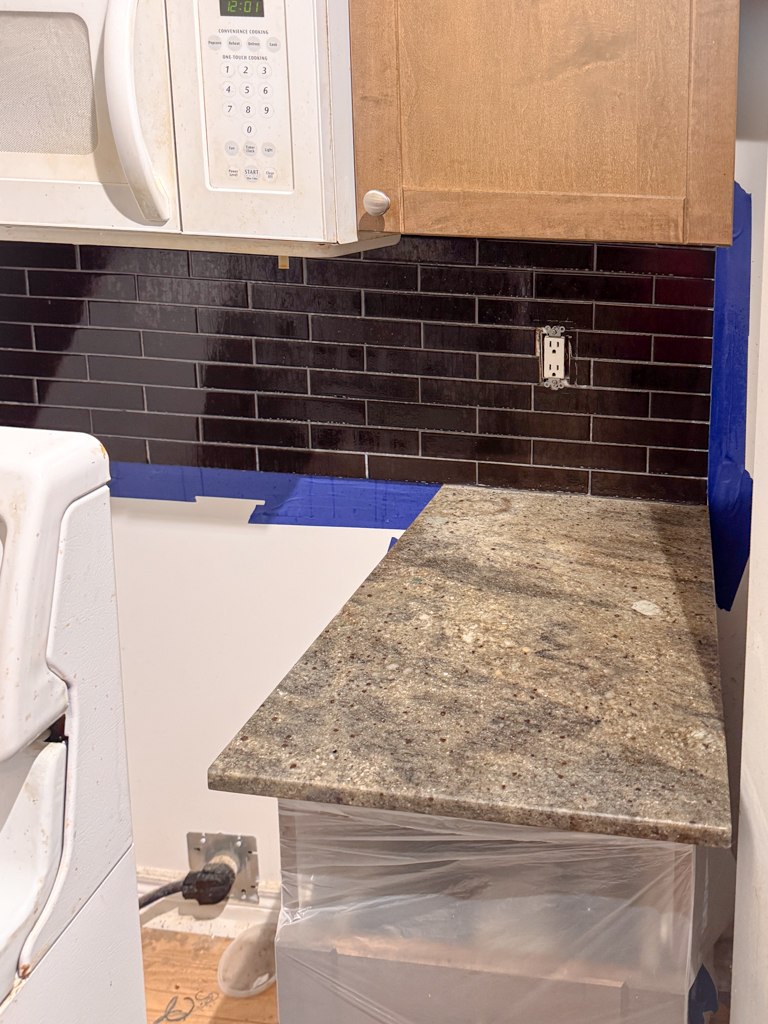
Kitchen Countertops and Backsplash Before Microcement Application
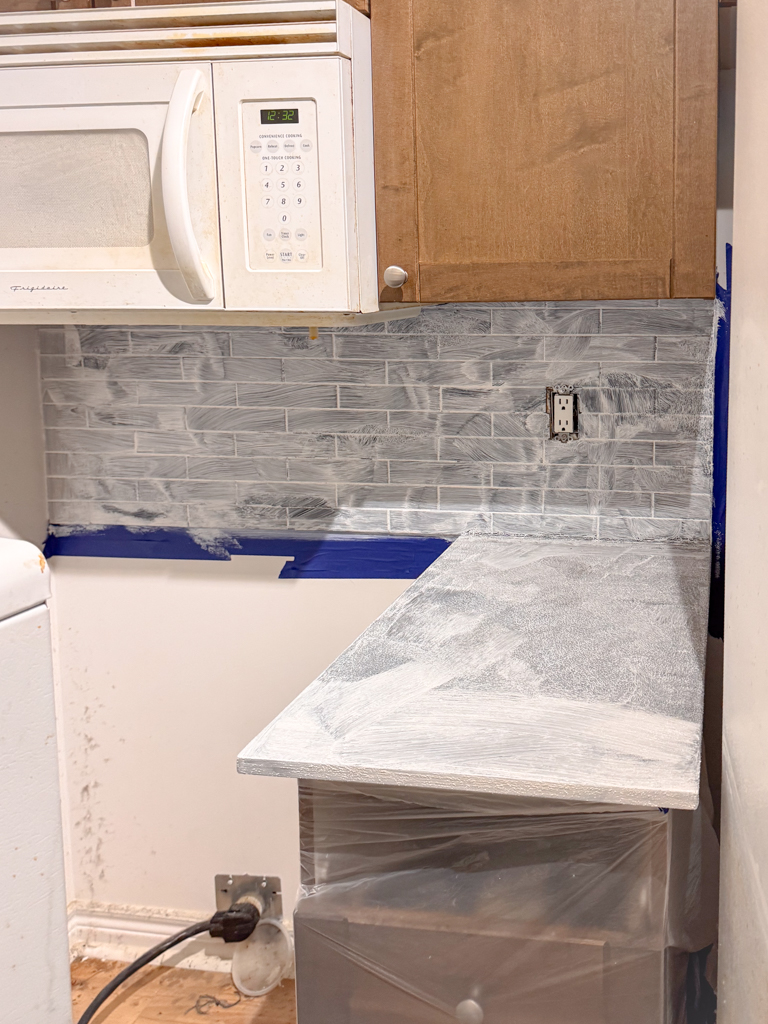
Kitchen Countertop and Backsplash After Priming for Microcement
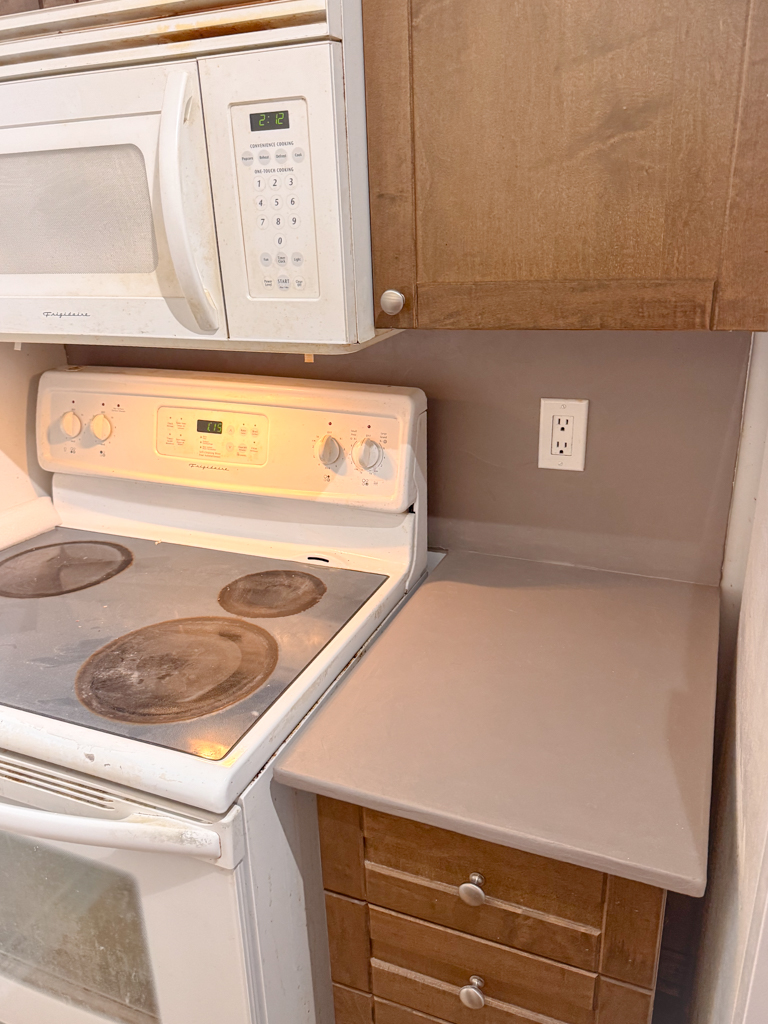
Finished Microcement Kitchen Application in Yorkville, Toronto
Smart Renovation: Microcement Over Existing Tile
The most significant advantage of choosing a microcement over existing tile is the “smart renovation” approach it enables. Instead of the loud, dusty, and time-consuming process of demolition, we simply cleaned and prepped the existing tiled surfaces. This not only saved our clients thousands of dollars in labor and disposal costs but also dramatically reduced the project timeline to 4 days. We were able to transform the entire look of the kitchen without the chaos typically associated with a complete tear-out.
This strategic choice highlights microcement’s versatility. By skipping the demolition phase, you get a beautiful, seamless finish on countertops and backsplashes while keeping your budget and sanity intact—an especially crucial benefit for condo living.
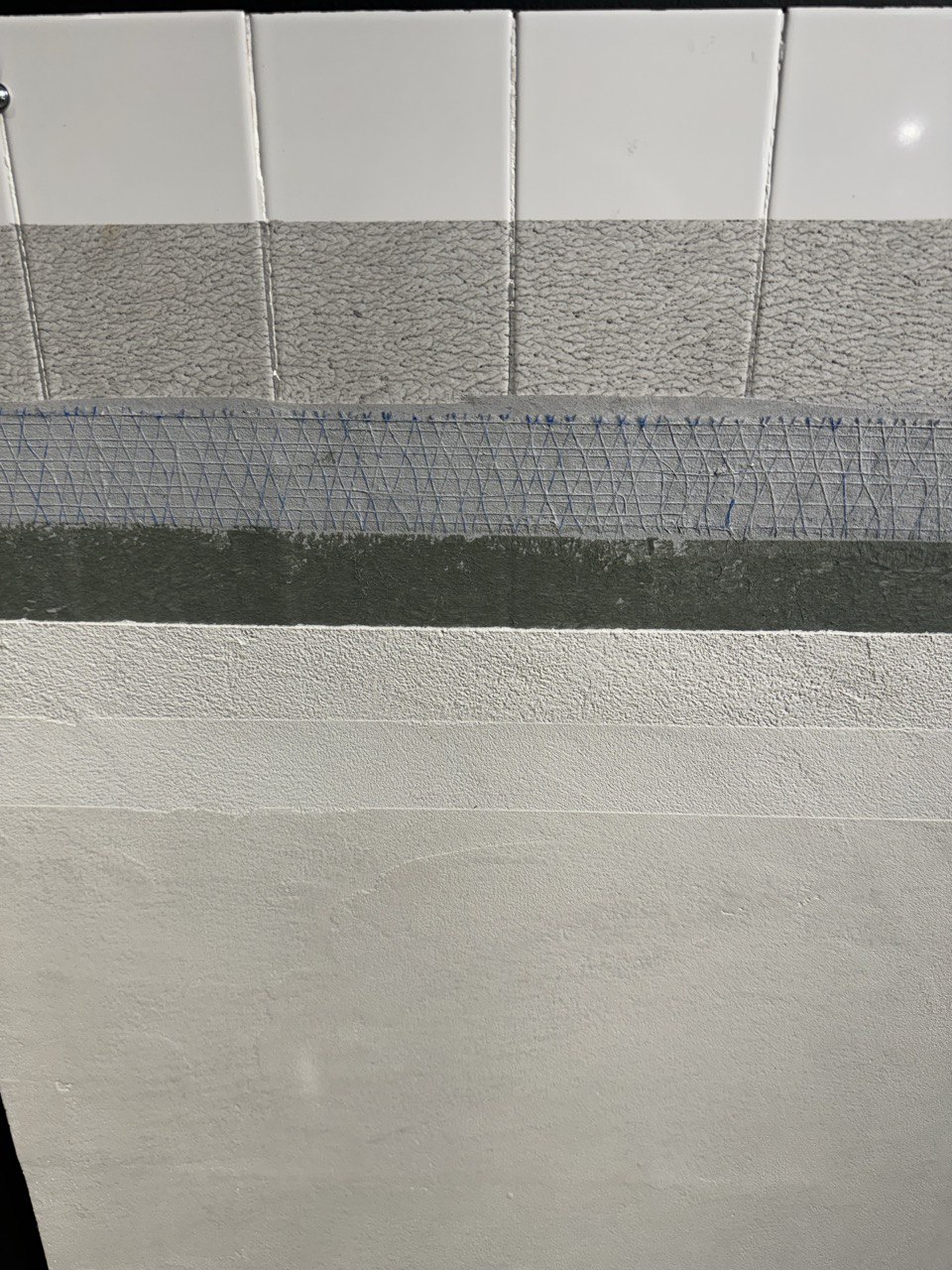
Applying Microcement Over Existing Tile: The 5-Layer Process with Mesh
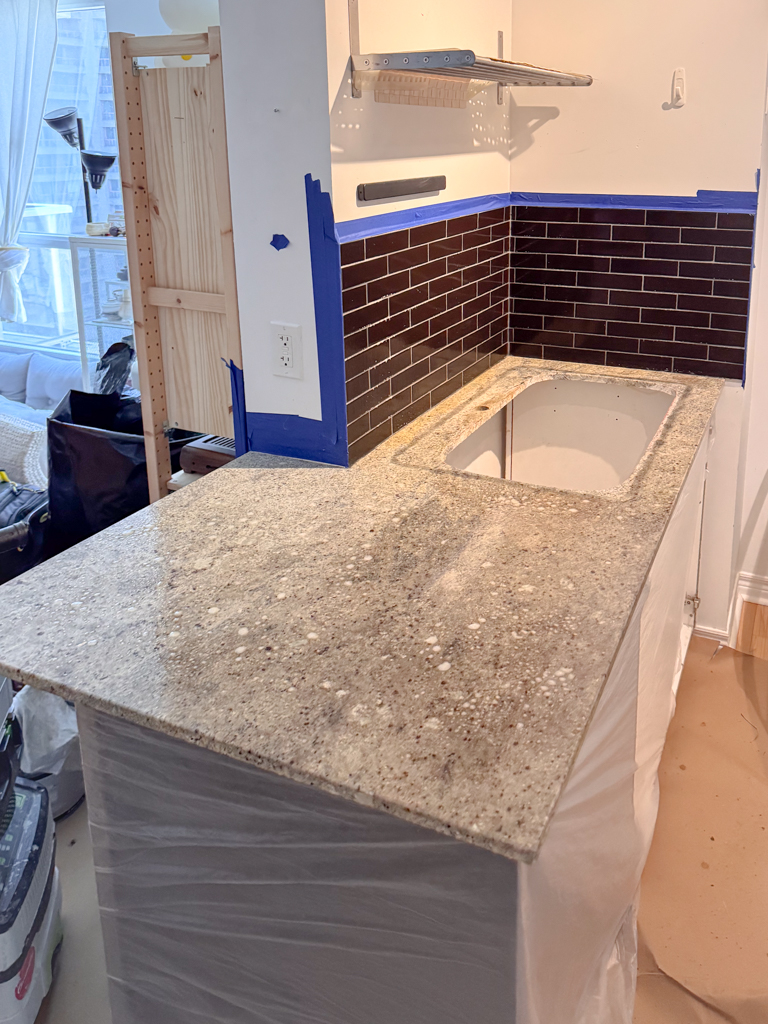
Kitchen Countertops and Backsplash Before Microcement
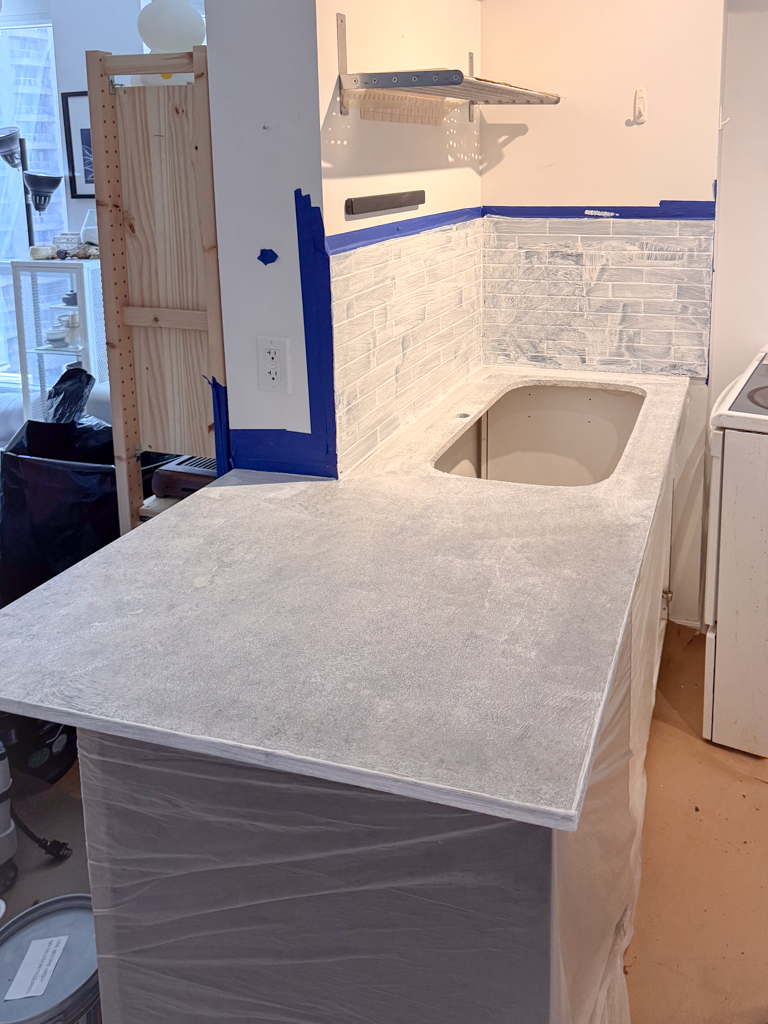
Kitchen Countertop After Priming for Microcement
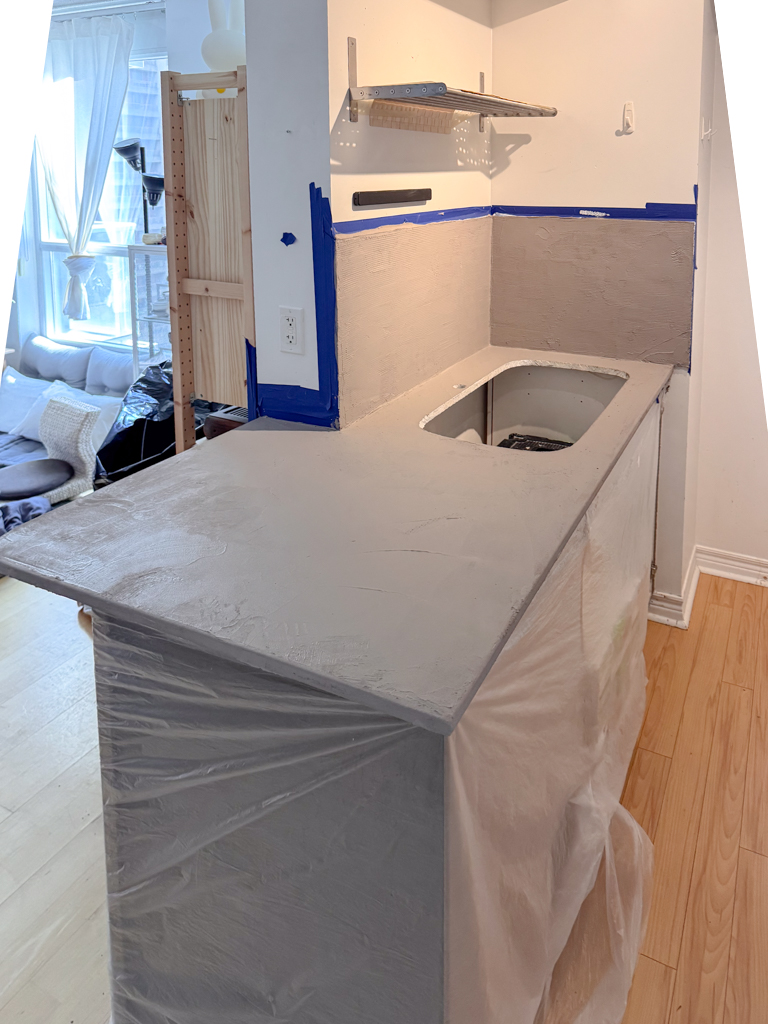
Second Coat of Microcement Applied to Kitchen Counter

Finished Microcement Kitchen Backsplash and Countertop in Yorkville
Beyond Microcement Countertops: More Ways to Use Microcement in Your Kitchen
While countertops and backsplashes are a fantastic place to start, the versatility of a high-quality microcement system allows for its use on virtually any surface in your kitchen. Microcement is the ideal material for creating a truly cohesive, seamless, and high-performance finish in your kitchen or bathroom.
Microcement Countertops & Kitchen Islands
Our feature project highlights how microcement can transform existing countertops, but it’s also a perfect choice for new kitchen islands and surfaces. Designed for extreme hardness, this material is incredibly resistant to wear and tear, making it an excellent alternative to conventional materials like granite or marble. You can achieve a completely unique, modern look that is both functional and beautiful.
Microcement Sinks and Backsplashes
One of the greatest advantages of microcement is the absence of joints. This allows us to create stunning, seamless backsplashes that flow directly into sinks and countertops, forming a single, continuous piece. The lack of grout lines prevents the accumulation of dirt or mold that typically builds up in damp corners, making cleanup a breeze and ensuring your space remains clean and hygienic.
Microcement Floors and Walls
Kitchen floors and walls endure a lot, from constant foot traffic to splashes of oil, wine, and food debris. Microcement is a smart choice for these high-traffic areas due to its high hardness and resistance to stains. Refer to our microcement floor installation in Luca Feloni store on Toronto’s upscale Bloor Street. The continuous, smooth surface is easy to clean with just water and neutral soap, ensuring your kitchen stays pristine no matter the culinary adventure.
The Cost of Microcement Kitchen Backsplash & Countertops
A microcement kitchen is a premium investment that balances stunning aesthetics with long-term durability. While it’s a more significant commitment than conventional finishes, its cost reflects its premium, handcrafted nature and its ability to deliver a truly custom and seamless look.
For a small condo kitchen, a microcement countertop and backsplash installation can range from $3,400 to $6,000. The final project cost is determined by several key factors:
- Surface Preparation: The condition of your existing countertops and backsplash is a major factor. Applying microcement over an old, damaged, or uneven surface will require significant repair work, which can increase the overall cost.
- Project Complexity: While larger projects can be more cost-effective per square foot, a small kitchen often involves intricate details, corners, and edges that require more precise hand-application and skill.
- Custom Finishes: Choosing specific colors, unique textures, or specialized sealers will influence the final price. Every custom element is part of a bespoke service tailored to your design.
Ultimately, this investment delivers a seamless, high-performance finish that is built to withstand daily use and provide a sophisticated aesthetic in your kitchen for years to come.
Microcement Kitchen: Frequently Asked Questions
Microcement Finish for a Bespoke Kitchen
Bring a clean, organic feel to your kitchen with our seamless finishes. Contact us today to begin your Microcement Kitchen project and get a free quote.
Serving Toronto, Los Angeles, Florida and Texas
| Toronto & GTA | |
|---|---|
|
|
| Jacksonville | Tampa | Miami | Broward County | Palm Beach County |
|---|---|---|---|---|
|
|
|
|
|
| Los Angeles | Sacramento | Long Beach | Santa Monica | Mission Viejo |
|---|---|---|---|---|
|
|
|
|
|
| Dallas | Houston | Austin | San Antonio | Fort Worth |
|---|---|---|---|---|
|
|
|
|
|



